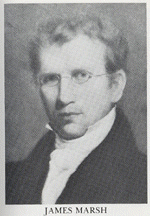|
|
Chapter 4: American Transcendentalism
James Marsh
|
|
Page Links: |Selected Bibliography | MLA Style Citation of this Web Page |
Site Links: | Chap 4: Index | Alphabetical List | Table Of Contents | Home Page |

James Marsh was a Congregationalist minister, a professor of philosophy at the University of Vermont, and from 1826 to 1833 served as president of the University of Vermont. His chief contribution to American Transcendentalism is his publication, in 1829, of Samuel Taylor Coleridge's Aids to Reflection, which contained aphorisms of both Coleridge and Archbishop Robert Leighton. This work introduced Americans to Coleridge and his views of German philosophical thought, in particular to the crucial distinction between Understanding and Reason&emdash;perhaps the key epistemological concept of the Romantic age. For Marsh and the New England Transcendentalists, the prevailing Lockean and Scottish metaphysical philosophies were unsatisfactory, since they excluded the possibility of spiritual power and agency and were logically incompatible with an essentially spiritual religion. The principles advocated by Coleridge, on the other hand, directly challenged Locke and provided the reconciliation of religion and philosophy that reason demanded.
Marsh also edited Coleridge's The Statesman's Manual in 1832 and The Friend in 1833. His efforts encouraged the Transcendentalists in their path away from John Locke and toward a more spiritual, more fulfilling, more authentic gospel.
